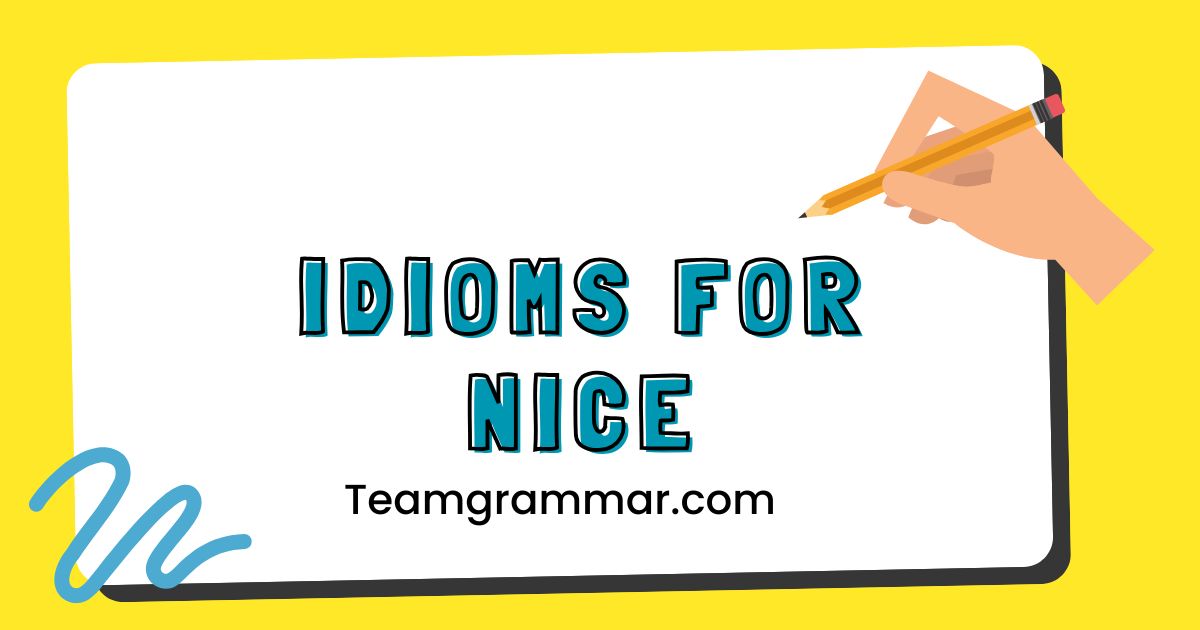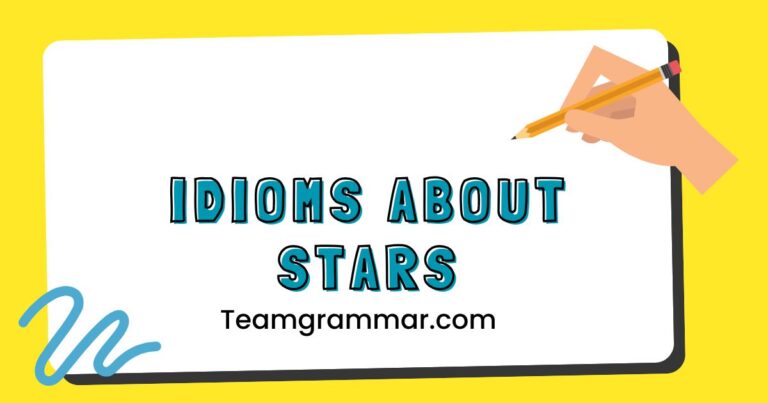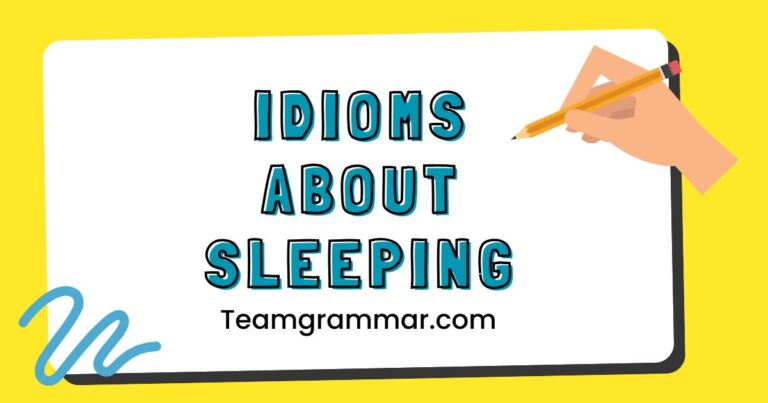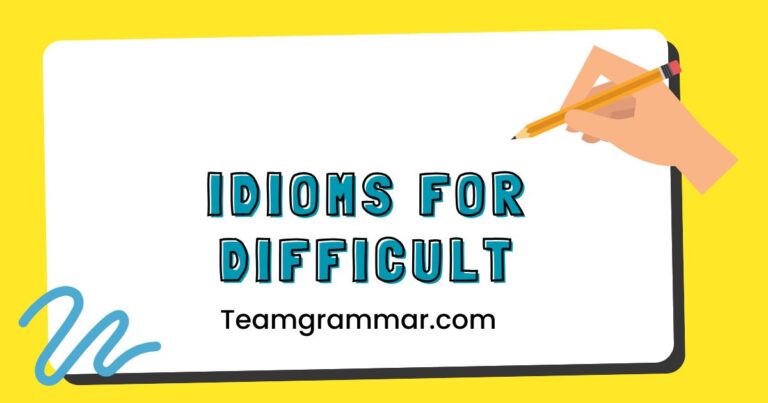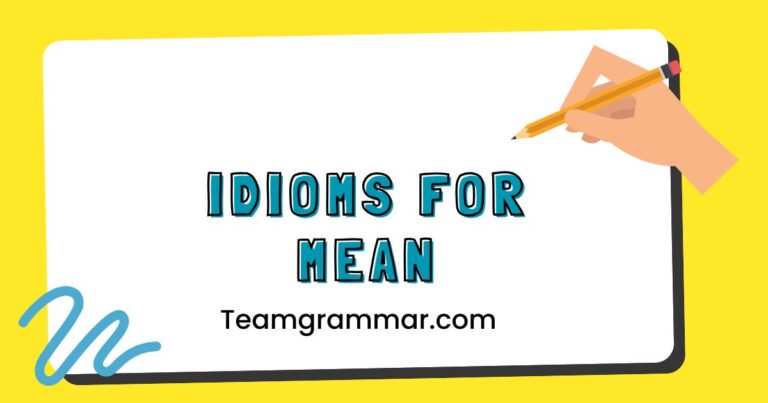31 Idioms for “Nice”: Expanding Your English Vocabulary
English is full of colorful expressions, and finding alternatives to the word “nice” is a great way to enrich your vocabulary and make your communication more engaging. This article explores a variety of idioms that convey the meaning of “nice,” offering a deeper understanding of their nuances and appropriate contexts.
Whether you’re an English language learner or a native speaker looking to refine your language skills, this guide will help you express yourself with greater precision and flair.
Learning idioms not only improves comprehension but also enhances your ability to connect with others on a more personal level. By understanding the subtle differences between these expressions, you can choose the most fitting idiom for any situation, adding depth and personality to your speech and writing.
This article is designed to be a comprehensive resource, offering definitions, examples, usage rules, and practice exercises to help you master these colorful alternatives to “nice.”
Table of Contents
- Definition of Idioms for “Nice”
- Structural Breakdown of Idioms
- Types and Categories of Idioms for “Nice”
- Examples of Idioms for “Nice”
- Usage Rules for Idioms
- Common Mistakes with Idioms
- Practice Exercises
- Advanced Topics
- FAQ
- Conclusion
Definition of Idioms for “Nice”
Idioms are expressions whose meanings cannot be understood from the literal meanings of the individual words. They are a crucial part of the English language, adding color, depth, and cultural context to communication.
When we talk about “idioms for nice,” we refer to phrases that serve as alternatives to the adjective “nice,” conveying similar sentiments such as approval, kindness, agreeableness, or pleasantness. These idioms often evoke stronger or more specific emotions than the word “nice” itself.
The function of these idioms is multifaceted. Primarily, they add variety and sophistication to one’s vocabulary, making speech and writing more engaging and expressive.
Secondly, they provide a deeper insight into the culture and history of the English-speaking world. Understanding these idioms allows for a more nuanced comprehension of conversations, literature, and media.
The contexts in which these idioms are used vary widely, ranging from casual conversations to formal writing, depending on the specific idiom and the intended audience.
Moreover, using idioms correctly demonstrates a high level of English proficiency and cultural awareness. It shows that the speaker or writer is not only familiar with the language but also understands its subtle nuances and idiomatic expressions.
This understanding is particularly important in professional settings, where clear and effective communication is essential. By mastering these idioms, one can enhance their ability to convey complex ideas and emotions with precision and clarity.
Structural Breakdown of Idioms
Idioms, by their very nature, defy straightforward structural analysis. Unlike grammatical structures that follow predictable rules, idioms are fixed expressions with meanings that are not derived from the literal meanings of their constituent words.
However, we can examine their structural components to understand how they function within sentences.
Many idioms consist of a verb and a preposition (e.g., “hit it off”), while others may include adjectives, nouns, or adverbs (e.g., “a heart of gold”). The order of words in an idiom is typically fixed, and altering it can change the meaning or render the expression nonsensical.
For example, “a heart of gold” cannot be rearranged as “gold of a heart” without losing its idiomatic meaning.
The grammatical function of an idiom within a sentence depends on its overall meaning. Some idioms function as adjectives, describing nouns (e.g., “He’s a diamond in the rough”).
Others function as verbs, describing actions (e.g., “They get along like a house on fire”). Understanding the grammatical role of an idiom is crucial for using it correctly in a sentence.
It is also important to recognize that idioms often have a figurative meaning, requiring the listener or reader to interpret them metaphorically.
Let’s consider the idiom “on cloud nine.” Structurally, it consists of a preposition (“on”), a noun (“cloud”), and a number (“nine”). However, its meaning has nothing to do with clouds or the number nine.
Instead, it means “extremely happy.” Similarly, the idiom “a piece of cake” consists of a noun phrase (“a piece of cake”), but it means “very easy.” This disconnect between literal and figurative meaning is a defining characteristic of idioms.
Types and Categories of Idioms for “Nice”
Idioms that convey the meaning of “nice” can be categorized based on the specific nuance they express. Here are some key categories:
Complimentary Idioms
These idioms express admiration or praise for someone or something. They highlight positive qualities and are often used to compliment someone’s character, skills, or appearance.
Agreeable Idioms
These idioms describe situations or people that are pleasant, acceptable, or satisfactory. They often indicate that something is in accordance with one’s preferences or expectations.
Pleasant Idioms
These idioms convey a sense of enjoyment or satisfaction. They are used to describe experiences, events, or people that are pleasing or delightful.
Kind Idioms
These idioms emphasize the compassionate, generous, or considerate nature of someone’s actions or character. They highlight acts of kindness and empathy.
Examples of Idioms for “Nice”
Here are numerous examples of idioms that can be used in place of “nice,” categorized by their specific meaning. Each table provides at least 20-30 examples to help you expand your vocabulary and understanding.
Idioms Describing Positive Qualities
These idioms are used to describe someone who has good qualities, is pleasant, or has admirable characteristics.
| Idiom | Meaning | Example Sentence |
|---|---|---|
| A heart of gold | A very kind and generous person | She always helps others; she has a heart of gold. |
| A gem | A highly valued or appreciated person | Our new employee is a gem; she’s always willing to help. |
| A diamond in the rough | Someone with potential but lacking refinement | He may seem unpolished, but he’s a diamond in the rough. |
| An angel | A very kind and helpful person | She’s been an angel, helping me through a difficult time. |
| Salt of the earth | A person of great kindness and integrity | My grandfather was the salt of the earth, always honest and hardworking. |
| One of a kind | Unique and special | Her artistic talent is one of a kind. |
| A good egg | A kind and reliable person | He’s a good egg; you can always count on him. |
| A sweetheart | A kind and affectionate person | She’s such a sweetheart, always thinking of others. |
| A peach | A pleasing and agreeable person | Our neighbor is a peach, always friendly and helpful. |
| A brick | Dependable, loyal, and supportive | He’s a brick, always there to support his friends. |
| Golden-hearted | Extremely kind and generous | She’s a golden-hearted woman who volunteers at the local shelter. |
| A true friend | Someone who is always there for you | He’s a true friend, always offering support and encouragement. |
| A real treasure | Someone who is highly valued and appreciated | Our team member is a real treasure; she brings so much positive energy. |
| Good as gold | Well-behaved and obedient (often used for children) | The children were good as gold during the entire trip. |
| A blessing | Someone or something that brings joy and happiness | Having her in our lives has been a true blessing. |
| A joy to be around | Someone whose presence is enjoyable and uplifting | He’s a joy to be around, always making people laugh. |
| A ray of sunshine | Someone who brings happiness and positivity | She’s a ray of sunshine, brightening everyone’s day. |
| A gift from God | Someone or something that is a precious and wonderful blessing | Our healthy baby is a gift from God. |
| A breath of fresh air | Someone or something that is refreshing and revitalizing | Her innovative ideas were a breath of fresh air in the stale meeting. |
| Wonderful | Extremely good or admirable | She’s a wonderful person, always willing to help others. |
| Fabulous | Extremely pleasing or successful | He’s a fabulous colleague, always bringing positive energy. |
| Marvelous | Extremely good or impressive | She’s a marvelous friend, always supportive and understanding. |
| Splendid | Very impressive and admirable | He’s a splendid individual, always conducting himself with grace and integrity. |
| Tremendous | Very great or impressive | She’s a tremendous asset to the team, always going above and beyond. |
| Outstanding | Exceptionally good | He’s an outstanding student, always excelling in his studies. |
| Exceptional | Unusually good; outstanding | She’s an exceptional talent, always impressing us with her abilities. |
Idioms Describing Agreeable Situations
These idioms describe situations, events, or things that are pleasing, acceptable, or satisfactory.
| Idiom | Meaning | Example Sentence |
|---|---|---|
| A walk in the park | Something very easy to do | The exam was a walk in the park for her. |
| A piece of cake | Very easy | The project was a piece of cake; I finished it in no time. |
| All roses | Pleasant and easy | The vacation wasn’t all roses; we had some unexpected challenges. |
| Smooth sailing | Easy and without problems | Once we got past the initial setup, it was smooth sailing. |
| Coming up roses | Turning out well | Despite the initial setbacks, everything is coming up roses now. |
| Right as rain | Perfectly fine or correct | After a good night’s sleep, I felt right as rain. |
| Tickety-boo | Fine, in good order | Everything is tickety-boo with the arrangements for the party. |
| A breeze | Easy and effortless | Learning to ride a bike was a breeze for him. |
| Plain sailing | Easy and straightforward | After the initial hurdles, it was plain sailing all the way. |
| Duck soup | Very easy to do | For an experienced programmer, this task is duck soup. |
| Easy peasy | Very easy | This recipe is easy peasy, even a beginner can make it. |
| A cinch | Something that is very easy to do | Passing the test was a cinch after all that studying. |
| A pushover | Something easily accomplished | Beating this level is a pushover with the right strategy. |
| No sweat | No problem; easy | “Can you help me move this?” “No sweat!” |
| A snap | Something very easy to do | Fixing the computer was a snap for the technician. |
| Like clockwork | Working perfectly and smoothly | The event went like clockwork, everything was perfectly timed. |
| A walk in the park | Something very easy to do | The project was a walk in the park after the initial planning. |
| A smooth ride | An easy and pleasant experience | The trip was a smooth ride, with no delays or complications. |
| A bed of roses | An easy and comfortable situation | Life is not always a bed of roses, but we can still find joy in it. |
| Sitting pretty | In a favorable position | After securing the contract, the company was sitting pretty. |
| Golden opportunity | A highly favorable chance | This job offer is a golden opportunity to advance your career. |
| In good shape | In a satisfactory condition | The car is in good shape, considering its age. |
| A good deal | A satisfactory arrangement | We got a good deal on the new car. |
| A fair shake | A just and equitable treatment | Everyone deserves a fair shake in life. |
Idioms Describing Pleasant Experiences
These idioms describe experiences, events, or people that bring joy, satisfaction, or happiness.
| Idiom | Meaning | Example Sentence |
|---|---|---|
| On cloud nine | Extremely happy | She was on cloud nine after receiving the award. |
| Over the moon | Extremely pleased and happy | They were over the moon when they found out they were expecting a baby. |
| In seventh heaven | Extremely happy | He was in seventh heaven when he got the promotion. |
| Tickled pink | Extremely pleased | She was tickled pink to receive such a thoughtful gift. |
| Walking on air | Feeling extremely happy and elated | After the successful launch, the team was walking on air. |
| Happy as a clam | Very happy and content | He’s happy as a clam now that he’s retired. |
| Grinning from ear to ear | Smiling widely | She was grinning from ear to ear when she saw her birthday surprise. |
| Living the dream | Experiencing a very enjoyable or successful life | He’s living the dream, traveling the world and working remotely. |
| Having a blast | Having a lot of fun | We had a blast at the party last night. |
| A whale of a time | A very enjoyable time | We had a whale of a time at the amusement park. |
| A good time was had by all | Everyone enjoyed themselves | The party was a success; a good time was had by all. |
| A real treat | A delightful experience | The concert was a real treat. |
| A feast for the eyes | Something visually pleasing | The art exhibit was a feast for the eyes. |
| Music to my ears | Something pleasing to hear | The news of the company’s success was music to my ears. |
| Sweet as honey | Very pleasant or delightful | Her singing voice is as sweet as honey. |
| Like a dream | Extremely pleasant and enjoyable | The vacation was like a dream come true. |
| A slice of heaven | A very pleasant experience or place | This beach is a slice of heaven on earth. |
| A little piece of paradise | A very pleasant place | The garden is a little piece of paradise, filled with flowers and birds. |
| To die for | Extremely desirable or enjoyable | The chocolate cake was to die for. |
| Pure bliss | Perfect happiness | Spending time with family is pure bliss. |
| Golden days | A period of happiness and prosperity | We cherish the golden days of our youth. |
| A gift from the gods | An extremely fortunate or pleasant experience | Finding this hidden gem of a restaurant was a gift from the gods. |
| A taste of heaven | A very pleasant experience | The massage was a taste of heaven after a long week. |
Idioms Describing Kind Actions
These idioms emphasize the compassionate, generous, or considerate nature of someone’s actions or character.
| Idiom | Meaning | Example Sentence |
|---|---|---|
| Go the extra mile | To do more than what is expected | She always goes the extra mile to help her students succeed. |
| Bend over backwards | To try very hard to help someone | He bent over backwards to make sure we had everything we needed. |
| Give the shirt off one’s back | To be extremely generous | He’s the kind of person who would give you the shirt off his back. |
| Have a soft spot for | To feel affection or fondness for someone | She has a soft spot for animals and volunteers at the local shelter. |
| Wear one’s heart on one’s sleeve | To openly show one’s feelings | He wears his heart on his sleeve, so everyone knows how he feels. |
| A shoulder to cry on | Someone who offers sympathy and support | She’s always been a shoulder to cry on when I’m feeling down. |
| Turn the other cheek | To forgive someone who has wronged you | He chose to turn the other cheek and forgive his brother. |
| Kill them with kindness | To respond to hostility with kindness | Instead of arguing, she decided to kill them with kindness. |
| Go out of one’s way | To make a special effort to do something | He went out of his way to help the elderly woman cross the street. |
| Lend a helping hand | To offer assistance | He’s always willing to lend a helping hand to those in need. |
| Do a good turn | To perform a kind or helpful act | She always tries to do a good turn every day. |
| Have a heart | To show compassion or sympathy | “Have a heart! Please don’t be so strict with him.” |
| Be a good Samaritan | To help someone in need | He acted as a good Samaritan and helped the stranded motorist. |
| Reach out to | To offer help or support | We should reach out to those who are struggling during the pandemic. |
| Be there for someone | To provide support and comfort | She’s always been there for me through thick and thin. |
| Make someone’s day | To do something that makes someone happy | Your kind words really made my day. |
| Brighten someone’s day | To make someone feel happier | Her smile always brightens my day. |
| Be a friend in need | To offer help during difficult times | He proved to be a friend in need when I lost my job. |
| Offer a helping hand | To provide assistance and support | We should always offer a helping hand to those who need it. |
| Be big-hearted | To be generous and kind | She’s a big-hearted person who always donates to charity. |
| Have a kind soul | To be a compassionate and caring person | He has a kind soul and always puts others first. |
| Be filled with compassion | To feel deep empathy and understanding for others | She’s filled with compassion for the less fortunate. |
Usage Rules for Idioms
Using idioms correctly requires an understanding of their specific meanings, contexts, and cultural nuances. Here are some key rules to keep in mind:
Formal vs. Informal Usage
Some idioms are more appropriate for informal settings, such as conversations with friends and family, while others are suitable for formal contexts, such as business presentations or academic writing. It’s important to choose idioms that align with the tone and style of the communication.
For example, idioms like “a piece of cake” or “easy peasy” are generally considered informal and should be avoided in formal writing. Instead, use more formal alternatives like “straightforward” or “easily accomplished.”
Cultural Context
Idioms are often rooted in specific cultural contexts, and their meanings may not be universally understood. When communicating with people from different cultural backgrounds, it’s important to be mindful of potential misunderstandings and to use idioms that are widely recognized and understood.
Some idioms may have different connotations or interpretations in different cultures. For example, an idiom that is considered humorous in one culture may be offensive in another.
It’s always a good idea to err on the side of caution and to avoid using idioms that may be culturally insensitive.
Avoiding Misunderstandings
Because idioms have figurative meanings, they can sometimes be misinterpreted by non-native speakers or those unfamiliar with the expression. To avoid misunderstandings, it’s important to use idioms in contexts that provide sufficient clues to their meaning.
When using an idiom, consider whether your audience is likely to understand it. If you’re unsure, you can provide a brief explanation or rephrase the sentence using more literal language.
Additionally, be aware that some idioms can have multiple meanings, so it’s important to ensure that the intended meaning is clear from the context.
Common Mistakes with Idioms
Many learners make mistakes when using idioms. Here are some common errors and how to avoid them:
- Literal Interpretation: Taking an idiom literally instead of understanding its figurative meaning.
- Incorrect: “He said it was a piece of cake, so I brought him a slice of cake.”
- Correct: “He said the task was a piece of cake, meaning it was very easy.”
- Incorrect Word Order: Changing the order of words in an idiom.
- Incorrect: “Heart of gold a she has.”
- Correct: “She has a heart of gold.”
- Using the Wrong Words: Substituting words in an idiom with similar words.
- Incorrect: “She’s on cloud eight.”
- Correct: “She’s on cloud nine.”
- Mixing Formal and Informal Idioms: Using casual idioms in formal situations.
- Incorrect: “The project was easy peasy, so we finished it quickly.” (in a business report)
- Correct: “The project was straightforward, so we finished it quickly.”
- Ignoring Cultural Context: Using idioms that are not appropriate or understood in certain cultures.
- Incorrect: Using a culturally specific idiom with someone who is unfamiliar with that culture without explanation.
- Correct: Using a more universally understood expression or explaining the idiom.
Practice Exercises
Test your understanding of idioms for “nice” with these exercises.
| Question | Answer |
|---|---|
| 1. Which idiom means “very easy”? | A piece of cake |
| 2. What does it mean to “have a heart of gold”? | To be very kind and generous |
| 3. Which idiom describes someone who is extremely happy? | On cloud nine |
| 4. What does “go the extra mile” mean? | To do more than what is expected |
| 5. Which idiom describes a very enjoyable time? | A whale of a time |
| 6. What does it mean to be “a good egg?” | To be a kind and reliable person |
| 7. What idiom describes a situation that is easy and without problems? | Smooth sailing |
| 8. Which idiom describes someone who is always there for you? | A true friend |
| 9. What does “lend a helping hand” mean? | To offer assistance |
| 10. What idiom describes someone who is unique and special? | One of a kind |
| Question | Your Answer |
|---|---|
| 1. Complete the sentence: “She is ______; she always thinks of others.” | |
| 2. Replace “nice” with an idiom: “He is a very nice person.” | |
| 3. What idiom can you use to describe a task that is very easy? | |
| 4. Complete the sentence: “After receiving the good news, she was ______.” | |
| 5. What idiom means to be extremely generous? |
Answers:
- such a sweetheart
- He has a heart of gold.
- A piece of cake
- Over the moon
- Give the shirt off one’s back
Advanced Topics
For advanced learners, here are some more complex aspects of idioms:
Idiomatic Variation Across English Dialects
Idioms can vary significantly across different English dialects, such as British English, American English, Australian English, and others. Some idioms may be unique to a particular region or community, while others may have different meanings or connotations in different dialects.
Understanding these variations is crucial for effective communication with people from diverse backgrounds.
For example, an idiom that is commonly used in American English may be unfamiliar or confusing to someone from British English, and vice versa. Similarly, idioms that are specific to a particular region, such as the Southern United States or the Australian Outback, may not be widely understood by people from other areas.
Historical Context of Idioms
Many idioms have historical origins that shed light on their meanings and usage. Understanding the historical context of an idiom can provide a deeper appreciation for its cultural significance and can help to avoid misinterpretations.
Some idioms may have originated from ancient myths, legends, or historical events, while others may have evolved from specific social or cultural practices.
For example, the idiom “raining cats and dogs” is believed to have originated from the medieval period, when poor sanitation and drainage systems caused animals to be washed away during heavy storms. Similarly, the idiom “bite the bullet” is thought to have originated from the practice of soldiers biting on a bullet during surgery to cope with the pain.
FAQ
Here are some frequently asked questions about idioms for “nice”:
- What is the difference between an idiom and a metaphor?
An idiom is a fixed expression whose meaning cannot be deduced from the literal meanings of its words, while a metaphor is a figure of speech that compares two unlike things to suggest a similarity between them. Idioms are often metaphorical, but not all metaphors are idioms.
- How can I improve my understanding of idioms?
Read widely, listen to native speakers, and pay attention to the context in which idioms are used. Use online resources and dictionaries to look up unfamiliar idioms, and practice using them in your own speech and writing.
- Are idioms the same in all English-speaking countries?
No, idioms can vary significantly across different English-speaking countries and regions. Some idioms may be unique to a particular dialect or culture.
- Is it okay to use idioms in formal writing?
Some idioms are appropriate for formal writing, while others are not. Choose idioms that align with the tone and style of the communication, and avoid using overly casual or colloquial expressions.
- How can I avoid misusing idioms?
Pay attention to the specific meanings and contexts in which idioms are used. Look up unfamiliar idioms in a dictionary or online resource, and practice using them in your own speech and writing. Be mindful of cultural differences and potential misunderstandings.
- What are some common mistakes people make with idioms?
Common mistakes include literal interpretation, incorrect word order, using the wrong words, mixing formal and informal idioms, and ignoring cultural context.
- Why are idioms important in English?
Idioms add color, depth, and cultural context to communication. They allow for more nuanced expression and demonstrate a high level of English proficiency. Understanding idioms is crucial for comprehending conversations, literature, and media.
- How can I tell if an expression is an idiom?
If the expression doesn’t make sense when you interpret the words literally, it’s likely an idiom. Also, idioms are often fixed expressions, meaning the words cannot be changed without altering the meaning.
- Are there resources to help me learn idioms?
Yes, many online dictionaries, language learning websites, and textbooks provide explanations and examples of idioms. You can also find idiom lists categorized by topic or theme.
- Should I try to use many idioms when speaking English?
Using some idioms can make your English sound more natural and expressive. However, avoid overusing them, as it can make your speech sound forced or unnatural. Use idioms sparingly and appropriately, ensuring that your audience understands them.
Conclusion
Mastering idioms for “nice” is a valuable step in enhancing your English language skills. By understanding the nuances and contexts in which these idioms are used, you can express yourself with greater precision and flair.
Whether you’re describing positive qualities, agreeable situations, pleasant experiences, or kind actions, there’s an idiom to fit every occasion.
Remember to pay attention to the usage rules, cultural contexts, and common mistakes associated with idioms. Practice using these expressions in your own speech and writing, and continue to expand your vocabulary through reading, listening, and engaging with native speakers.
With dedication and practice, you’ll be able to use idioms confidently and effectively, adding depth and personality to your communication.
As you continue your language learning journey, embrace the richness and diversity of the English language. Idioms are just one aspect of this vast and fascinating world, but they offer a unique window into the culture, history, and creativity of English-speaking communities.
By exploring and mastering these colorful expressions, you’ll not only improve your language skills but also gain a deeper appreciation for the beauty and complexity of the English language.

